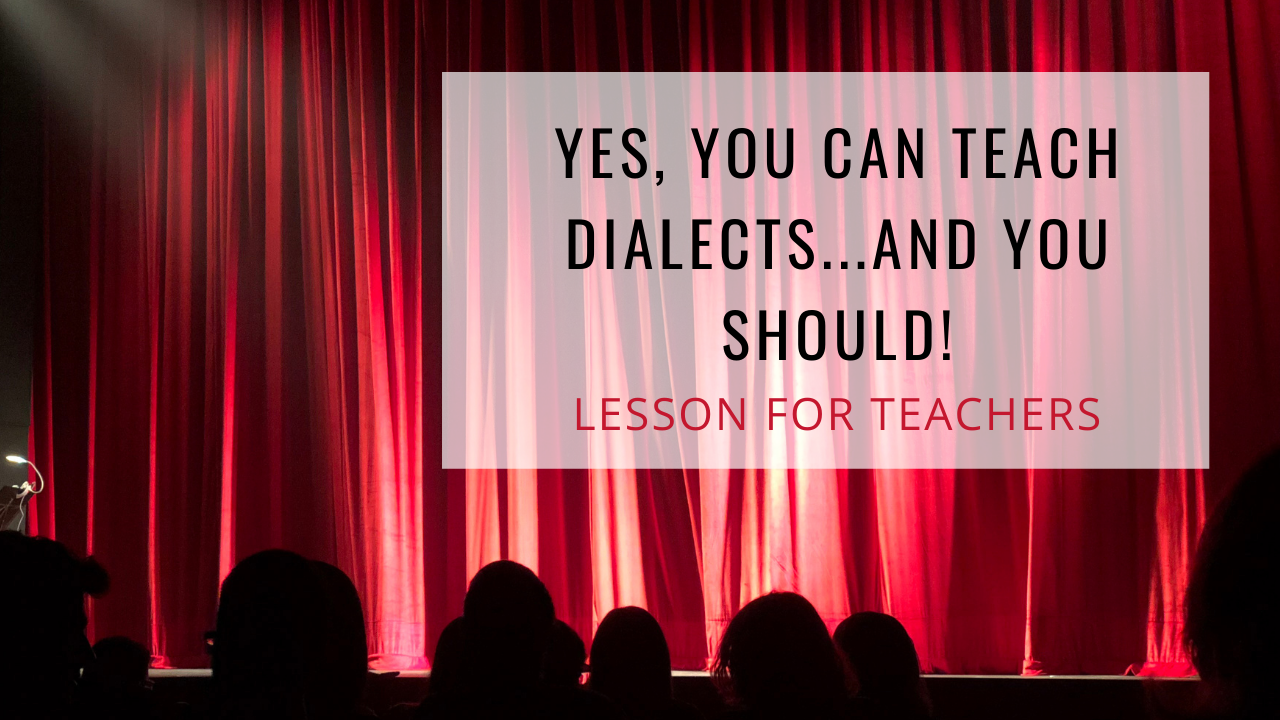Yes, You Can Teach Dialects...And You Should!
Jul 14, 2021
It might surprise you to know that I don’t have a natural talent for accents and dialects.
You: Then how do you teach accents and dialects?
Me: Because you don’t have to be “good at accents” or have a natural ear for mimicking speech to teach accents and dialects.
There is a systematic process to teaching and learning accents and it’s the same process that I teach in The Accent Channel Method of Speech Improvement. Once you’ve learned my method, you can teach any accent or dialect…General Southern, Standard British, Australian…you name it!
It really boils down to this basic premise:
An accent or dialect is a set of sound substitutions, rhythms, stress patterns, intonations, and vocabulary.
To change an accent or dialect, all you have to do is...
Identify and replace the sound substitutions, rhythms, stress patterns, intonations, and vocabulary of the current accent with the sound substitutions, rhythms, stress patterns, intonations, and vocabulary of the goal accent.
Teaching a London accent or a New York accent really isn’t that different than teaching a General American Accent.
The process of identifying and changing specific sound substitutions is the same. The sounds are different, but the process is exactly the same.
And you really should know how to teach more than one accent.
Why?
Well, there are many reasons, but I think these are the most important:
1. It expands your expertise: Knowing how to teach various dialects makes you more of an accent expert and a much better teacher.
2. It helps your ESL students: I teach several accents/dialects to my ESL speaking students as a training exercise. Playing around with different sounds, rhythms, intonations, and other features of some of the regional dialects of English makes the General American accent feel more comfortable and attainable.
Playing with dialects also helps to break down the psychological blocks that everyone faces when changing the way they speak. People feel freer to exaggerate when they are having fun with a dialect, almost like they are playing a character, and then when they go back to General American, it just feels more comfortable and natural. Don’t know why this works, but it always does!
3. You’ll be prepared to help students who want to lose or reduce a regional accent and learn to use a more general American accent and there is definitely a market for this.
Please understand, I’m not saying that any dialect is “good” or “bad” or “better” or “worse” than any other accent or dialect. But the truth is that there are people out there (I am one of them!) who don’t feel comfortable using the speech patterns of their regional accent or dialect in our daily lives.
We have our reasons! Professional, personal, we don’t like the judgements and perceptions from other people about the way we speak, we want to express our ideas without being told that our accents are “cute” or “funny,” we are tired of being asked where we grew up…and so many more.
It's not up to us as teachers to decide whether changing a native accent or dialect is right or wrong. The choice to change the way one speaks is completely up to each individual student. So, if a student comes to us with this request, we should help them because we have the skills to do it.
Which leads me to my next point.
4. Accent Equality: As I just said, it’s not up to us to decide if changing an accent is right or wrong, BUT we do need to be careful about promoting one accent as “better” than another, so if you truly believe that all accents and dialects are equally beautiful and should be equally accepted, you should back that up by knowing how to teach more than just the General American Accent. And by teaching more than one accent or dialect, you are proving that you believe that.
5. Teaching dialects to actors and voiceover artists is a really great niche market and you have the skills to do it. You just need to learn some special considerations for working with actors and scripts and you need to get more familiar with the sounds and features of specific accents and dialects. Teaching accents and dialects to actors is a lucrative, in-demand service. Plus, it is a lot of fun!
So please don’t underestimate your ability.
Yes, you need a systematic method of learning and teaching accents and dialects.
Yes, you have to study.
Yes, you have to practice.
But you don’t have to be perfect.
And like everything else when it comes to teaching, you will get better with experience.
We cover exactly how to teach several different dialects in The Accent Channel Method of Speech Improvement and because working with actors is my specialty, I also share lessons and tips on how to find and work with this very specific population of students.
I've helped several new teachers feel confident enough about teaching dialects to add it to their list of services and if you're interested in doing this work, I'd love to help you get started too. You can get more info about the program by clicking here.
Turn Your Skills into a High-Value Service with Speech & Accent Coaching
Millions of students around the world are looking for clear, supportive training and you may already have the foundation to help them. You don’t need a big following, advanced degree, or tech expertise to get started.
Download this free guide to learn the essential skills, simple tools, and beginner-friendly steps to start offering paid accent and communication training—whether you want a meaningful new career or a profitable side service.

